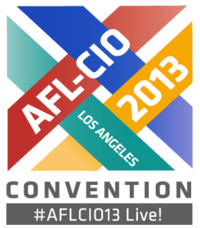As I discussed yesterday, the AFL-CIO’s Constitutional Convention in LA this week began with a lot of buzz about proposals that progressive groups that were not labor organizations might be invited to affiliate with the AFL-CIO. A number of union leaders expressed both practical and principled objections to such a tie-up. Practical, because there were times when their interests diverged – as when the Sierra Club and the construction unions clashed over the XL pipeline. Principled, because some felt workers needed a voice entirely of their own, and that would be lost in such a conglomerate. Plenty of progressive think tanks, coalitions, and pressure groups already existed, and they could always create new ones if the current ones were inadequate. The labor movement, they contended, should remain a movement of workers, for workers, and by workers.
Delegates struck an interesting note late in the convention by approving a resolution supporting more bipartisan political outreach.
NOW, THEREFORE, BE IT RESOLVED, that the AFL-CIO embrace an approach for its political action program that seeks to foster greater political independence in order to become better inoculated against sudden shifts in the political winds; and
BE IT FURTHER RESOLVED, that the AFL-CIO take practical steps, at every level of government, to cultivate and nurture relationships with members of all parties who are willing to put partisan politics aside and work to advance the interests of our members; and
BE IT FURTHER RESOLVED, that in congressional districts where the politically drawn lines dictate that a Republican candidate has an upper hand, that the AFL-CIO will encourage moderate candidates who support fairness and equity for workers; and
BE IT FURTHER RESOLVED, that it will now be the accepted policy of the AFL-CIO to view and conduct its endorsement process, political giving, political communications, independent expenditures, SuperPAC efforts, and voter and Election Day GOTV field mobilization efforts in a pragmatic, bipartisan approach that focuses primarily on candidates’ positions on issues of direct importance to workers.
This message was informed by experience. Under the Davis-Bacon Act firms bidding on federal construction contracts are required to pay “prevailing” wages (in many cities, the wages and benefits found in union contracts) to workers they employ. These wages ensure that each year hundreds of thousands of construction workers, whether they belong to unions or not, receive a living wage for their work. The building trades unions have defended this requirement for more than 80 years, despite multiple changes of party control in Congress, by cultivating enough supporters on both sides of the aisle for shelter from an ill political wind.
Remember too recent events in Wisconsin, where a firestorm of worker protests and a vigorous recall effort (and for that matter, the opposition of the Wisconsin Catholic Conference and the USCCB) failed to protect the union rights of Wisconsin’s teachers and other public employees. If labor had been able to peel away a handful of Republican state senators, Act 10 would have failed and Wisconsin’s public employees would still have collective bargaining rights. Improbable? Perhaps, but not impossible: Wisconsin US Representative and tea party hero Paul Ryan, of all people, has been a consistent vote for “Davis-Bacon” prevailing wages.
Certainly, finding friends of labor in today’s Republican Party won’t be easy. Governor Walker and his party colleagues picked the fight in Wisconsin, not working families. But it’s also true that America’s labor unions include millions of workers who regularly pull the lever for the Republican candidates – not because they reject their union, but because they disagree with the Democrats on some other grounds they find important, be it gun rights, the war on terror, or (as with many Catholic workers) on the right to life. With the right organization, these members could be an asset helping the party of Lincoln heed the better angels of its nature.








